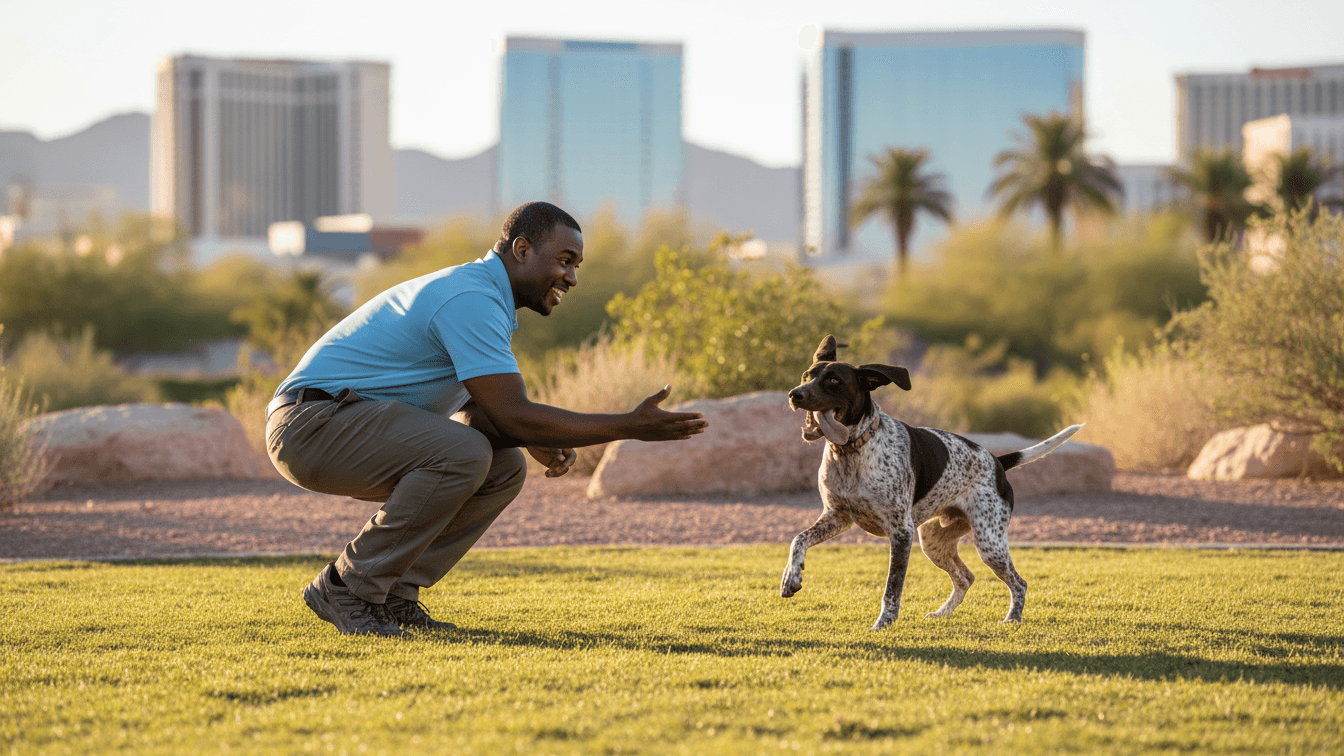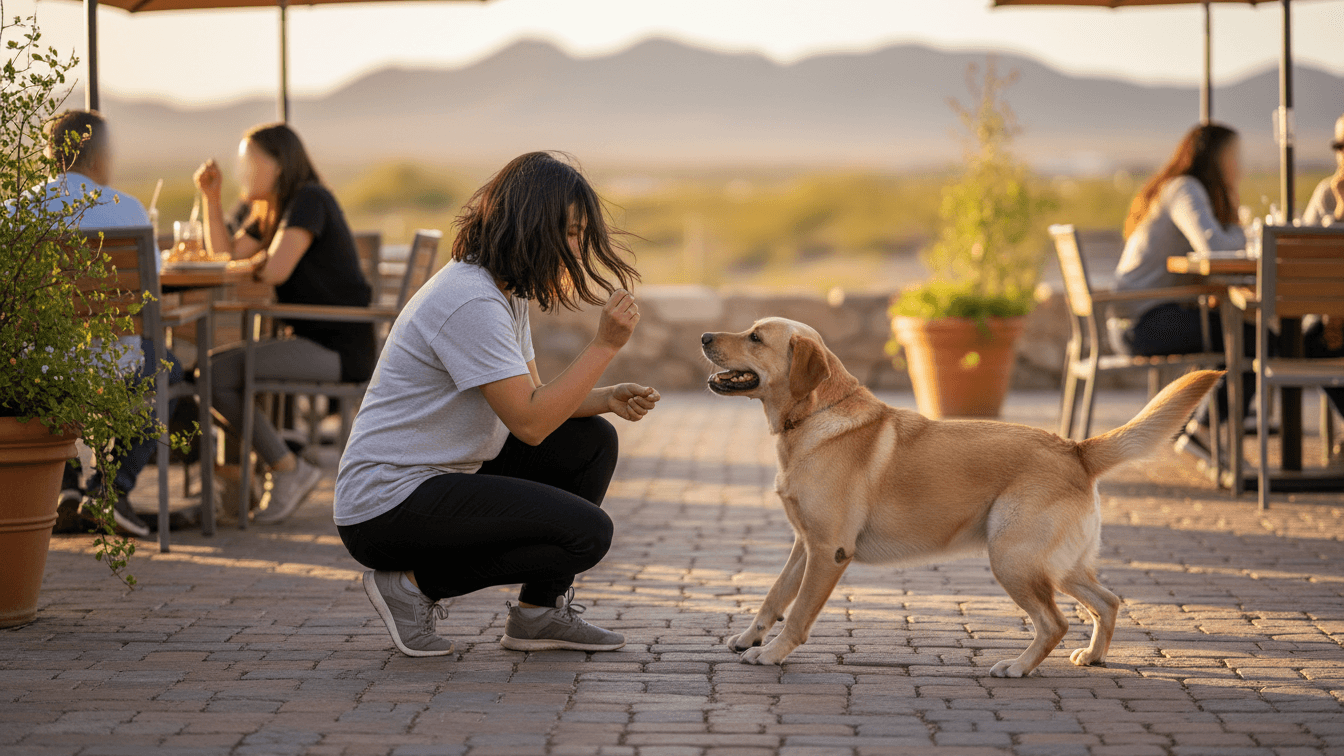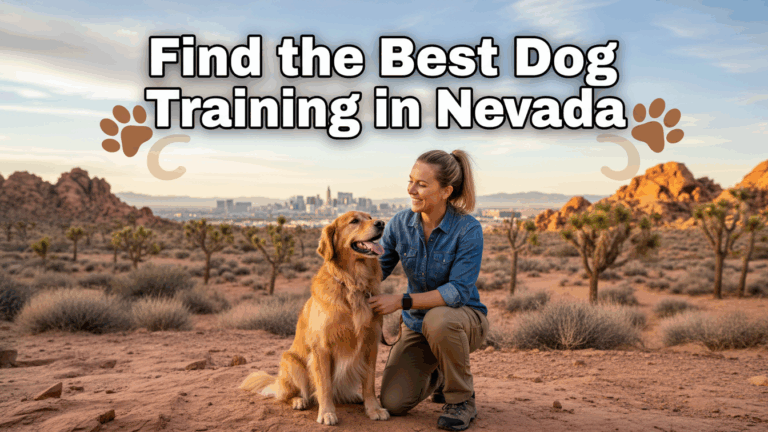Your Complete Guide to Choosing a Dog Trainer in Nevada
Finding the right professional dog trainer in Nevada means understanding how desert living, public land access, and local regulations shape your training needs. Whether you’re navigating Reno’s busy downtown streets, hiking Lake Tahoe trails, or managing your dog’s behavior in Las Vegas neighborhoods, training for dogs in the Silver State requires specific preparation.
Nevada’s unique mix of urban centers, vast open spaces, and busy tourist areas creates distinct challenges for dog owners. Your dog needs to stay calm around crowds on the Las Vegas Strip, handle off-leash reliability on Bureau of Land Management land, and manage the heat during summer months when outdoor training windows are limited.
How to Choose the Right Trainer
Start by looking for someone who uses positive reinforcement training and understands Nevada’s specific environment. Your trainer should help you prepare for scenarios like walking through casino districts, managing your dog around wildlife on public trails, and building solid recalls for safe off-leash time.
Credentials matter when comparing trainers’ experience and methods. Look for dog trainer certifications like CPDT-KA, KPA-CTP, or IAABC-CDBC for serious behavior problems. If your dog shows aggression or fear, ask about advanced credentials like CBCC-KA or science-based programs such as CTC.
In-home dog training works well for teaching door manners, addressing barking complaints in apartment complexes, and practicing leash skills in your actual neighborhood. Group classes make sense once your dog can focus around distractions, preparing them for Nevada’s dog-friendly patios and outdoor events.
Ask about the trainer’s experience with desert-specific challenges like rattlesnake avoidance training, heat management during outdoor sessions, and building reliable off-leash skills for hiking and camping trips.
Common Dog Training Methods Explained

Reward-based methods create lasting behavior changes while keeping training sessions positive and low-stress. These approaches help your dog learn to handle Nevada’s diverse environments confidently.
Basic obedience covers sit, down, stay, place, recall, and leash training so your dog can manage walks through crowded areas, stay calm at outdoor cafes, and respond reliably when off-leash on trails.
Puppy training focuses on socialization, potty training, bite control, crate comfort, and early leash manners. Starting young prevents problems before they develop, especially important in Nevada’s dog-friendly culture where puppies encounter many new experiences quickly.
Behavior modification addresses reactivity, separation anxiety, fear, or resource guarding through careful desensitization and counterconditioning. For complex cases, look for trainers who collaborate with veterinary behaviorists.
Private lessons let you customize everything around your lifestyle and your dog’s specific needs. Day training can accelerate results when you need faster progress or have limited time for training sessions.
Group classes help your dog practice good manners around other dogs and people. The best classes screen participants carefully, give dogs plenty of space, and teach calm behavior rather than just excitement.
Specialized training like service dog training or therapy dog training requires structured programs, public-access skills, and clear step-by-step progression. These programs demand extra time and consistency.
Board and train programs can be helpful for intensive work, but make sure you understand what methods the trainer uses when you’re not present and how they’ll teach you to maintain the results at home.
Skip trainers who rely on fear, intimidation, or pain-based tools. Humane methods are safer, more effective long-term, and help build the trusting relationship you want with your dog.
Average Cost of Dog Training in Nevada (Updated for 2025)
Prices across Nevada vary based on the trainer’s credentials, session length, location, and whether you’re in a metro area like Las Vegas or Reno versus rural communities. Here’s what most dog owners are paying in 2025.
| Service Type | Average Cost (Nevada) |
|---|---|
| Puppy classes (4-6 weeks) | $140-$250 total |
| Group obedience classes (4-6 weeks) | $150-$280 total |
| Private lessons (60-90 min) | $100-$175 per session |
| In-home coaching packages (4-6 visits) | $400-$850 total |
| Day training (trainer works your dog) | $400-$900 per week |
| Behavior consult for aggression/anxiety | $140-$240 initial |
| Board and train (2-4 weeks) | $1,800-$4,200 total |
Expect higher rates in Las Vegas and Reno compared to smaller communities like Elko or Pahrump. Trainers may charge travel fees for longer distances or specialized work like rattlesnake avoidance training.
Make sure you understand what’s included, how progress gets tracked, and whether the trainer offers a free consultation before you commit.
Questions to Ask a Potential Dog Trainer
- What training methods do you use, and how do you keep sessions positive and stress-free?
- What credentials do you hold, like CPDT-KA or KPA-CTP, and do you pursue continuing education such as CPDT-KSA?
- How will you tailor the training program for my dog’s needs and our Nevada lifestyle?
- Do you offer private lessons, group classes, or day training, and which approach fits my goals best?
- How will we measure progress and know when to add more distractions?
- What are your total costs, including travel fees, and what’s your cancellation policy?
- Do you carry liability insurance, and can you provide proof?
- For behavior issues, will you work with my veterinarian or a veterinary behaviorist if needed?
- What should I practice between our training sessions to help my dog improve?
- Do you have experience with Nevada-specific challenges like rattlesnake encounters, extreme heat management, or training for off-leash reliability on public lands?
Local Nevada Rules and Considerations
Nevada state law doesn’t impose many statewide dog regulations, but cities and counties enforce their own leash laws, licensing requirements, and noise ordinances.
Most Nevada cities require leashes in public areas except designated off-leash zones. Las Vegas, Reno, Henderson, and other municipalities enforce 6-foot leash requirements in parks, on sidewalks, and in commercial districts.
Clark County and Washoe County both require current rabies vaccination and annual dog licenses. License fees are lower for spayed or neutered dogs. You can find licensing information through your county animal services department.
Excessive barking can violate local noise ordinances, especially in apartment complexes and densely populated neighborhoods. Work with your trainer on alert barking and separation anxiety before complaints become formal citations.
Nevada doesn’t require special licenses for dog trainers, but certified dog trainer credentials show professional commitment to humane, science-based methods. Trainers who board dogs for payment may need kennel licenses and inspections through county animal control.
If your trainer wants to use public parks for commercial dog training classes, they may need permits and proof of liability insurance from local parks departments.
Bureau of Land Management areas and national forests allow off-leash dogs in many locations, but you’re responsible for keeping your dog under voice control and preventing wildlife harassment. Reliable recall training is essential before taking your dog off-leash on public lands.
Local Nevada Resources for Dog Owners
These locations give you places to practice obedience training, work on socialization, and provide safe enrichment for your dog. Always follow posted rules and clean up after your dog.
- Barking Basin Dog Park in Reno offers separate areas for large and small dogs with agility equipment and plenty of shade structures for hot days.
- Children’s Memorial Park Dog Park in Las Vegas provides fenced play areas in multiple sections, making it ideal for practicing recalls and working on dog-to-dog manners during quieter times.
- Sunset Park Dog Park in Las Vegas features large open spaces with double-gated entries, perfect for building off-leash reliability in a controlled environment.
Many Nevada communities maintain additional dog parks and open spaces where you can practice leash skills and build your dog’s confidence around distractions.

FAQs
How much does in-home dog training cost?
Most Nevada trainers charge $100-$175 per in-home visit, with package discounts available when you book multiple sessions. Behavior modification for aggression or anxiety typically starts at the higher end of that range.
Is in-home dog training worth it?
Absolutely, because you’re working on problems exactly where they happen. Your trainer can address door manners, jumping on guests, barking at passersby, and household management issues right in your home, then move outside to practice neighborhood leash skills on your actual walking routes.
Can you pay someone to house train your dog?
Yes, many trainers offer puppy programs that include potty training, crate routines, and daily schedules. Day training can speed up the process while teaching you how to maintain consistency after the trainer leaves.
What is the 3-3-3 rule for dog training?
This guideline helps new or adopted dogs adjust: expect about 3 days for your dog to decompress, 3 weeks to learn your routines, and 3 months to feel completely settled. Good training programs work with this natural adjustment timeline rather than rushing the process.
How long will it take to reach my training goals?
Most puppies and friendly adult dogs show solid progress within 4-8 weeks if you practice daily. Fear, reactivity, or aggressive dog training typically requires several months of careful behavior modification with gradual increases in difficulty and distraction levels.
What should I bring to group classes?
Pack a flat collar or harness, a 6-foot leash, high-value treats, water for both you and your dog, and current vaccination records if your trainer requests them. Leave retractable leashes at home for safety reasons.
What’s the leash law in Nevada?
Nevada state law doesn’t mandate statewide leash requirements, but most cities and counties enforce their own leash laws. Las Vegas, Reno, Henderson, Sparks, and most other municipalities require dogs to be leashed in public areas except inside designated off-leash dog parks.
Do I need a dog license in Nevada?
Yes, most Nevada counties and cities require annual dog licenses. Clark County and Washoe County both mandate licenses for dogs over four months old. License fees are typically reduced for spayed or neutered dogs and senior citizens. Contact your local animal services department for specific requirements and fees.
What shots does my dog need in Nevada?
Nevada law requires current rabies vaccination for all dogs. Your veterinarian may also recommend distemper-parvo combo, bordetella, and other vaccines based on your dog’s lifestyle and exposure risks. Keep vaccination records accessible for licensing, boarding, and group classes.
Are dog trainers required to be licensed in Nevada?
Nevada doesn’t require special licenses for professional dog trainers. Trainers follow normal business regulations, but if they offer board and train services or kennel dogs overnight, they may need facility licenses and inspections through county animal control departments.
Where can I practice off-leash recall?
Use fenced dog parks to practice recall safely and legally. Nevada also offers extensive Bureau of Land Management areas and national forest lands where off-leash dogs are allowed, but your dog must be under voice control and you’re liable for any problems. Build solid obedience training in fenced areas before progressing to open public lands.
Which dog parks allow training around Nevada?
Most Nevada dog parks welcome training practice during off-peak hours when fewer dogs are present. Barking Basin Dog Park in Reno, Children’s Memorial Park Dog Park in Las Vegas, and Sunset Park Dog Park in Las Vegas all provide good spaces for working on recalls, stays, and socialization. Visit during quieter morning hours for the best training environment.
What beaches or trails allow dogs for training?
Lake Tahoe's Nevada State Park beaches allow leashed dogs in designated areas, perfect for practicing calm behavior around water and crowds. Nevada’s many Bureau of Land Management trails and areas welcome leashed and off-leash dogs where you can work on trail manners, wildlife distraction training, and recall skills. Always check specific regulations before visiting, as some areas have seasonal restrictions or require leashes year-round.
How do I prepare my dog for Nevada’s heat?
Train during early morning or evening hours when temperatures are cooler. Bring plenty of water for both you and your dog, and watch for signs of overheating like excessive panting or slowing down. Many expert dog trainers recommend shifting to indoor training sessions or air-conditioned facilities during summer months. Practice paw protection by checking pavement temperature before walks.
Should I train my dog for rattlesnake avoidance?
If you plan to hike or camp in Nevada’s desert areas, rattlesnake avoidance training can be lifesaving. Some trainers offer specialized programs that teach your dog to recognize and avoid rattlesnakes through positive reinforcement. This training is especially important if you’ll spend time on trails where rattlesnakes are common.
Finding the right combination of humane methods, consistent practice, and Nevada-specific preparation will help your dog become a well-behaved companion whether you’re exploring urban areas or backcountry trails. A top dog trainer who understands the state’s unique challenges will give you the best results for your lifestyle.
